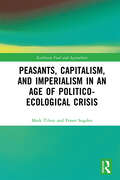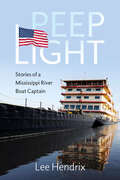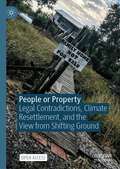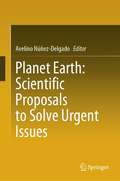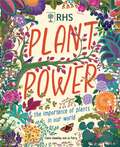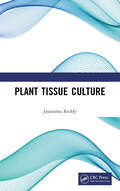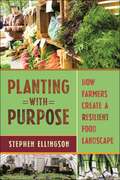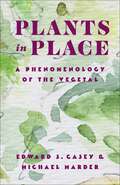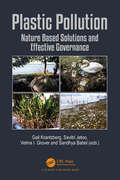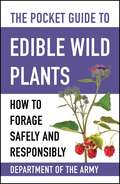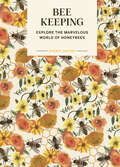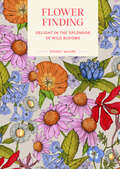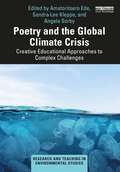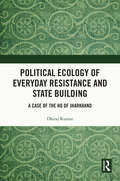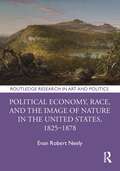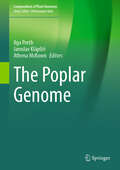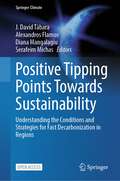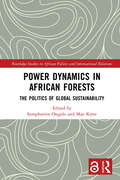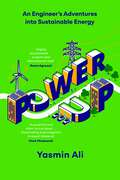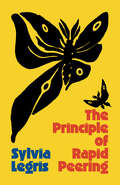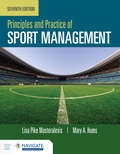- Table View
- List View
Peasants, Capitalism, and Imperialism in an Age of Politico-Ecological Crisis (Earthscan Food and Agriculture)
by Mark Tilzey Fraser SugdenThis book utilises a new theoretical approach to understand the dynamics of the peasantry, and peasant resistance, in relation to capitalism, state, class, and imperialism in the global South. In this companion volume to Peasants, Capitalism, and the Work of Eric R. Wolf, the authors further develop their thinking on agrarian transitions to capitalism, the development of imperialism, and the place of the peasantry in these dynamics, with special reference to the global South in an era of politico-ecological crisis. Focusing on the political role of the peasantry in contested transitions to capitalism and to modes of production outside of, and beyond, capitalism, the book contends that an understanding of these dynamics requires an analysis of class struggle and of the resources, material and discursive, that different classes can bring to bear on this struggle. The book focuses on the rise of capitalism in the global South within the context of imperial subordination to the global North, and the place of the peasantry in shaping and resisting these dynamics. The book presents case studies of contested transitions to agrarian capitalism in Bolivia, Ecuador, Guatemala, Mexico, Peru, and South Asia. It also examines the case of transition to a post-capitalist mode of production in Cuba. The book concludes with an assessment of the nature of capitalism and imperialism within the context of the contemporary politico-ecological crisis, and the potential role of the peasantry as agent of emancipatory change towards social and environmental sustainability. This book will be of great interest to students and researchers in the areas of peasant studies, rural politics, agrarian studies, development, and political ecology.
Peep Light: Stories of a Mississippi River Boat Captain
by Lee HendrixMost people only consider the Mississippi River when they cross it or when it inconveniently abandons its banks. But every year, millions of tons of cargo are transported by towboats on the river. In Peep Light: Stories of a Mississippi River Boat Captain, Captain Lee Hendrix provides unique insight on people who work and live on and near the Mississippi River. Hendrix, formerly a pilot for the Delta Queen Steamboat Co., has worked on the Mississippi for fifty years, first as a towboat deckhand in 1972 and eventually as a pilot of towboats and passenger vessels. In 2014, Hendrix became captain of the towboat Mississippi with the US Army Corps of Engineers, then he later retired to return to passenger vessels. For Hendrix and others like him, he is at home on the river, living and dining with the same people they work with, working with familiar faces for years at a time and yet meeting new people every day.Demonstrating a fascination not only with the river but also with the passions and dreams of those who live and work on it, these stories range from personal reflections on aging, experiencing one’s first night on the river and the complex emotions that come with it, working on the deck, promotion to pilot, the characters working aboard these boats, and the history of the river itself. Peep Light unites humans with the river through engaging storytelling and sheds light on Hendrix’s rare experience along one of the most powerful and important waterways in the world.
People or Property: Legal Contradictions, Climate Resettlement, and the View from Shifting Ground
by Alessandra Jerolleman Elizabeth Marino Nathan Jessee Liz Koslov Chantel Comardelle Melissa Villarreal Daniel de Vries Simon MandaThis open access book explores the intersection of property law, relocation, and resettlement processes in the United States and among communities that grapple with migration as an adaptation strategy. As communities face the prospect of relocating because of rising seas, policy makers, disaster specialists, and community leaders are scrambling to understand what adaptation pathways are legally possible. While in its ideal application, law functions blindly and without variation, the authors find that legal contradictions come to bear on resettlement processes and place certain communities further in harm’s way. This book will unearth these contradictions in order to understand why successful community-based resettlement has presented such a challenge to communities that are experiencing increasing land deterioration as a result of climate change.
Plains Vizcachas: Biology and Evolution of a Peculiar Neotropical Caviomorph Rodent
by Luciano Luis Rasia Claudio Gustavo Barbeito Francisco AcuñaThe plains vizcacha (Lagostomus maximus) is a remarkable rodent of the Neotropic given several peculiar aspects of its biology, some of them quite unique among rodents or even among mammals. This book gathers specialists studying plains vizcachas from very different approaches, including paleontology, systematics, morphology, physiology, development and conservation. It is divided in two Parts, 1) Evolutionary History, and 2) Morphology, Development and Physiology. It will surely be a required reading for any researcher working with caviomorph rodents, mastozoology of the Neotropics or internal anatomy and physiology of mammals.
Planet Earth: Scientific Proposals to Solve Urgent Issues
by Avelino Núñez-DelgadoThis book represents the most comprehensive overview of issues affecting our planet and the forefront solutions, including climate change, air, water, soil pollution, demography, and access to food and water. This edited book, led by Prof. Núñez-Delgado, counts with the participation of leading researchers across a wide range of disciplines to be an inspiring and motivating document to promote sustainability and biodiversity. Those of you asking for trustworthy analyses about sustainability and climate change and the vanguard solutions will find this book fascinating.
Plant Power: The Importance of Plants in our World
by Claire LlewellynPlants are amazing! They are found in every part of the world, growing from tiny seeds into beautiful blooms, gigantic trees and the delicious fruit and vegetables we eat. Plants are vitally important to humans, animals and even the climate, providing food, shelter, medicines and even helping to clean our planet's air and water. This book tells you everything you need to know about plants, from how they grow, reproduce and make their own food to the variety of ways that humans and animals use plants every single day.Readers can find out about plant parts and plant life cycles, pollination, food chains, photosynthesis, seeds and plant uses, such as in food, homes, furniture, musical instruments and medicines. We find out how plants can inspire us and how we need to protect plants so they can help protect us.This book is perfect for children aged 7+.
Plant Tissue Culture
by Jayarama ReddyThis book is a comprehensive text on plant tissue culture, with its past, present, and future prospects and techniques discussed in detail. In the first three chapters, the history, terminologies, and applications are given in detail. The fourth chapter is dedicated to the instrumentation of plant tissue culture. The basic techniques used in PTC are described in the sixth chapter. The details of the constituents and types of different nutrient media are discussed in the eighth chapter. In chapter number 9, methods of haploid production have been described. Bioreactors are the instruments that are used for the large-scale production of plantlets and plant products. This book is useful for all the students, researchers, teachers, and industrialists interested in plant tissue culture. Print edition not for sale in india. This book is a comprehensive text on plant tissue culture, with its past, present, and future prospects and techniques discussed in detail.
Planting With Purpose: How Farmers Create a Resilient Food Landscape
by Stephen EllingsonExamines local food movement activism in a period of increasing climate chaos and neoliberal crisis, economic inequalities and political divisionsIn the face of numerous challenges, small-scale farming for local markets requires enormous courage and optimism. The decision to become a farmer often arises from a profound desire to uphold certain values and beliefs, driven by the moral and emotional motivations to contribute to a greater good.Central New York’s local food market draws a unique cohort of individuals who see farming as more than just a livelihood; it is a way to define a good life and contribute to the well-being of the society they cherish. Their moral order revolves around shared beliefs in sustainability and stewardship of the land, emphasizing health and risk management, cooperation over competition, and a deep sense of justice. For these farmers, relationships and family ties are foundational to their work, creating a strong sense of community within the local food system.This book delves into the captivating world of local food markets in a “Rust Belt” region of the state, where 51 individuals representing 45 different farms, restaurants, agricultural non-profits, and local food retailers share their inspiring stories through conversations and interviews. Author Stephen Ellingson explores the intricate web of moral commitments, self-understandings, and emotional experiences that drive and sustain small-scale farming for the local food market. By amplifying the voices of these unsung heroes, it gives recognition to the crucial role they play in society and offers important insights into the values that underpin their contributions to the local food system.
Plants in Place: A Phenomenology of the Vegetal (Critical Life Studies)
by Edward S. Casey Michael MarderPlants are commonly considered immobile, in contrast to humans and other animals. But vegetal existence involves many place-based forms of change: stems growing upward, roots spreading outward, fronds unfurling in response to sunlight, seeds traveling across wide distances, and other intricate relationships with the surrounding world. How do plants as sessile, growing, decaying, and metamorphosing beings shape the places they inhabit, and how are they shaped by them? How do human places interact with those of plants—in lived experience; in landscape painting; in cultivation and contemplation; in forests, fields, gardens, and cities?Examining these questions and many more, Plants in Place is a collaborative study of vegetal phenomenology at the intersection of Edward S. Casey’s phenomenology of place and Michael Marder’s plant-thinking. It focuses on both the microlevel of the dynamic constitution of plant edges or a child’s engagement with moss and the macrolevel of habitats that include the sociality of trees. This compelling portrait of plants and their places provides readers with new ways to appreciate the complexity and vitality of vegetal life. Eloquent, descriptively rich, and insightful, the book also shows how the worlds of plants can enhance our understanding and experience of place more broadly.
Plastic Pollution: Nature Based Solutions and Effective Governance (Water)
by Gail Krantzberg Savitri Jetoo Velma I. Grover Sandhya BabelPlastics show up in every area of our lives. They are durable, cheap and light, properties that make them attractive but also problematic for the environment. The focus of this book is not just to highlight the problem of plastics, its definition, and how plastic pollution is impacting human health and environment but also to look at some best practices in both nature based solutions and in the field of law and policies. The first section of the book focuses on plastic pollution – it’s origin, relationship to climate change, linear/circular economy, followed by sustainable plastics, scientific solutions, and how policies can address plastic pollution. This includes looking at better designs, more sustainable feedstocks, and partnerships between various stakeholders worldwide including USA, China, Canada, South Korea, Thailand. This book will interest those who are associated with the production industry, packaging industry, and waste management industry as well as, academicians, students and policymakers.
The Pocket Guide to Edible Wild Plants: How to Forage Safely and Responsibly (Pocket Guide)
by U.S. Department of the ArmyNow outdoorsman and survivalists can own this comprehensive and handy guide to edible plants authored by the US Army. Whether you are a stranded soldier, a wilderness hiker, or you just want to know which plants growing in your backyard are edible, this is an invaluable resource. Nothing is more important for the outdoorsman than being prepared to survive in the wild, and the ability to recognize edible plants is an indispensable way to do so. When survival is the chief objective, often plants are one&’s best (and only) source of nutrition and medicine. The key is being familiar with their botanical structure, where to find them, and which will provide the most sustenance. Equally as important is knowing which are potentially poisonous or fatal if consumed. This is a full-color reference to plants both common and rare, from purslane to the prickly pear. Inside are details on how to locate, identify, and prepare edible wild plants, as well as information on their specific nutritional benefits and other handy uses. This guide also includes a section on which plants to avoid and how to test for edibility. A no-nonsense survival aid, this book is an essential guide for serious adventurers and the armchair botanist alike. Anyone who has spent serious time outdoors knows that in survival situations, wild plants are often the only sustenance available. The proper identification of these plants can mean the difference between survival and death.
Pocket Nature: Explore the Marvelous World of Honeybees (Pocket Nature)
by Ariel SilvaStep into the remarkable world of the honeybee in this illuminating and delightfully illustrated pocket guide.For budding apiarists, this introductory book offers fascinating information about honeybees and everything you need to know to begin your own beekeeping journey. For example, did you know that from birth, female bees are promoted through roles such as nurse, baker, and guardian of the hive? Or that male bees’ primary purpose is simply to mate with a queen, but only 0.1% of them ever will?In these pages, you’ll discover the inner workings of the beehive, the properties of honey, the basics of keeping bees, and the joys that come from this meditative hobby, including a thriving garden, environmental stewardship, and a supportive community (not to mention delicious honey!). A whole world awaits—and it’s just outside your door.FOR BEEKEEPERS AND BEE ENTHUSIASTS: This petite and brightly colored book will appeal to anyone interested in bees and beekeeping, whether they’re just starting their journey or well on their way. Don’t let the size fool you—this compact bee book is packed with insightful information and helpful tips for novices and experts alike.WHY BEES MATTER: We need bees. According to Greenpeace, bees are responsible for one in every three bites of food humans consume. Without them, Earth, and our daily existence, wouldn’t be the same. The active Save the Bees movement that has erupted in recent years shows that people are adamant about bee justice and committed to spreading awareness and knowledge about bees. This pocket guide is a practical and inspiring addition to the cause.HIGHLY GIFTABLE NATURE BOOK: Filled with appealing illustrations, calming meditations, and tidbits about honeybees that will make your jaw drop, this is a lovely gift for bee lovers, nature enthusiasts, and others who want to learn more about these incredible specimens. Pair with jars of honey or other books in the Pocket Nature series to delight a friend, colleague, parent, or sibling—anyone who loves learning about our amazing natural world.Perfect for:Bee enthusiasts, apiarists, and beginner beekeepersNature lovers and hikersMindfulness practitionersFollowers of @bowserbee on TikTokBirthday, anniversary, housewarming, or seasonal gift for nature lovers
Pocket Nature: Delight in the Splendor of Wild Blooms
by Andrea DebbinkFind peace and stillness among the flowers with this lovely pocket guide to observing, identifying, and appreciating wild blooms.Explore the charmed world of flora with this delightful flower book, part of the Pocket Nature series. Learn when and where to look for wildflowers, how to identify different varieties, and what flowers can teach us, from fireweed's resilience to dandelion's adaptability.This petite guidebook also offers creative ideas for appreciating blooms, such as making botanical art, writing poetry, meditating in nature, and arranging a beautiful bouquet when picking is appropriate. Flower and nature lovers and mindfulness practitioners will appreciate the appealing illustrations and thoughtful reflections throughout.Take Flower Finding on your next nature walk or create a thoughtful gift for a friend or loved one by pairing it with new garden clippers or a vase of pretty blooms.EASY WAY TO SPEND MORE TIME OUTSIDE: More and more people are turning to the outdoors to escape and unwind. Searching for wildflowers is an enjoyable pastime that gets you outside, moves your body, and calms your mind. With mindful activities sprinkled throughout, Flower Finding is more than a flower identification guide; it is also an invitation to spend more time in nature and away from screens and tech.GREAT GIFT BOOK: Petite, gorgeously illustrated, and written in an inviting tone, this approachable guide makes a great gift or self-purchase for nature and flower lovers. And who doesn't love flowers? Package the book with hiking boots, garden clippers, a beautiful vase, or other books in the Pocket Nature series for a delightful anytime gift.PERENNIAL & COLLECTIBLE: The topics covered in the Pocket Nature series are perennial—flowers, beaches, clouds, and sunsets will always be there to enjoy and admire. With new titles coming out every season, there will be ever-new opportunities to grow a charming collection that looks great on your bookshelf.Perfect for: Flower lovers and home gardenersNature enthusiasts, walkers, and hikersConservationists and environmentalistsMindfulness practitioners, meditators, and anyone seeking simple practices for stress managementAnyone looking for a birthday, Mother’s Day, Father’s Day, holiday, or just-because gift for nature-loving family and friendsCollectors of the Pocket Nature books
Poetry and the Global Climate Crisis: Creative Educational Approaches to Complex Challenges (Research and Teaching in Environmental Studies)
by Amatoritsero Ede Sandra Lee Kleppe Angela SorbyThis book demonstrates how humans can become sensitized to, and intervene in, environmental degradation by writing, reading, analyzing, and teaching poetry. It offers both theoretical and practice-based essays, providing a diversity of approaches and voices that will be useful in the classroom and beyond. The chapters in this edited collection explore how poetry can make readers climate-ready and climate-responsive through creativity, empathy, and empowerment. The book encompasses work from or about Oceania, Africa, Europe, North America, Asia, and Antarctica, integrating poetry into discussions of specific local and global issues, including the value of Indigenous responses to climate change; the dynamics of climate migration; the shifting boundaries between the human and more-than-human world; the ecopoetics of the prison-industrial complex; and the ongoing environmental effects of colonialism, racism, and sexism. With numerous examples of how poetry reading, teaching, and learning can enhance or modify mindsets, the book focuses on offering creative, practical approaches and tools that educators can implement into their teaching and equipping them with the theoretical knowledge to support these. This volume will appeal to educational professionals engaged in teaching environmental, sustainability, and development topics, particularly from a humanities-led perspective.
Political Ecology of Everyday Resistance and State Building: A Case of the Ho of Jharkhand
by Dhiraj KumarResource extraction and conflicts over natural resources are a global phenomenon, including in India. This book explores the process of state formation through developmental intervention in the resource-rich areas of Jharkhand in eastern India which are inhabited by the indigenous Ho community. The cultural practices and livelihoods of Indigenous tribes, like the Ho community in Jharkhand, are deeply linked with the local ecology. The conflict in Jharkhand is intertwined with state development projects and capitalist interventions. This book examines the history of these projects and the issues of territorialisation, dispossession, accumulation, and marginalization which communities have been fighting against for many decades. It examines the process of development policies and projects shaping and restructuring the resource-rich ecology in the region and addresses the interrelated issues of development-induced dispossession, resistance, ecological transformation, governance, illegalities, and state-building. It focuses on the questions: what do development projects bring to the Ho community; what induces them to resist and negotiate; and how state decentralization schemes and local governance in resource conflict areas strengthen State capacities? The book highlights the consequences on the livelihoods and cultural practices of the local people because of ecological transformation and everyday resistance. Comprehensive and important, this book will be of interest to students and researchers of anthropology, sociology, political ecology, social work, development studies, ecology, developmental sociology, indigenous studies, law, and economic anthropology.
Political Economy, Race, and the Image of Nature in the United States, 1825–1878 (Routledge Research in Art and Politics)
by Evan Robert NeelyPolitical Economy, Race, and the Image of Nature in the United States, 1825–1878 is an interdisciplinary work analyzing the historical origins of a dominant concept of Nature in the culture of the United States during the period of its expansion across the continent.Chapters analyze the ways in which “Nature” became a discursive site where theories of race and belonging, adaptation and environment, and the uses of literary and pictorial representation were being renegotiated, forming the basis for an ideal of the human and the nonhuman world that is still with us. Through an interdisciplinary approach involving the fields of visual culture, political economy, histories of racial identity, and ecocritical studies, the book examines the work of seminal figures in a variety of literary and artistic disciplines and puts the visual culture of the United States at the center of intellectual trends that have enormous implications for contemporary cultural practice.The book will be of interest to scholars working in art history, visual culture, American studies, environmental studies/ecocriticism, critical race theory, and semiotics.
The Poplar Genome (Compendium of Plant Genomes)
by Ilga Porth Jaroslav Klápště Athena McKownThis book is the first comprehensive compilation of research on state‐of‐the-art genomics on the most advanced model tree species including genome assemblies, insights into genomic structural features and methylation patterns, whole‐genome resources used for population genomics and adaptation to climate, enabled breeding vs. classical genetics and traditional breeding, comparative genomics, and elucidations on functional genomics. The latest developments in the genomics of wood formation are particularly highlighted. Altogether, the book contains over 300 pages in over 15 chapters authored by globally reputed experts in the relevant fields of this tree crop’s genomics research. This book is useful for students, teachers, and scientists in academia and governmental or private tree improvement agencies or companies interested in genetics, pathology, entomology, physiology, molecular genetics and breeding, in vitro culture and genetic engineering, land restoration, and agroforestry solutions.
Positive Tipping Points Towards Sustainability: Understanding the Conditions and Strategies for Fast Decarbonization in Regions (Springer Climate)
by J. David Tàbara Alexandros Flamos Diana Mangalagiu Serafeim MichasThis open access book provides the first comprehensive review of the state of the art of social tipping points applied to energy systems from a social interdisciplinary perspective. It does so by presenting a novel theory of systemic and transformative change, linking it to empirical cases assisted with relevant assessment methodologies, including modeling. The authors unveil the narratives and visions, the transformative capacities as well as deliberate strategies and collective actions that at one point in time have been able - or were prevented - to tip a given social-ecological system towards low-carbon, sustainable trajectories in diverse high-intensive carbon regions around the world. This volume shows that self-reinforcing learning feedbacks connecting transformative solutions and strategies across scales and domains can be induced by targeted policy interventions both in local and regional contexts. It further indicates how changes in behavioral patterns, supported by good governance of disruptive technologies, carbon (dis)investment and finance processes as well as new forms of civic engagement, can create the necessary transformative enabling conditions for the emergence of positive tipping points towards low-carbon sustainable futures. The book is a must-read for students, researchers, and scholars, as well as policy-makers and practitioners interested in a better understanding of sustainability, climate, and energy issues and in assessing the potential impacts and effectiveness of strategic interventions aimed at accelerating just sustainable decarbonization processes.
Power Dynamics in African Forests: The Politics of Global Sustainability (Routledge Studies in African Politics and International Relations)
by Symphorien Ongolo Max KrottThis book addresses historical perspectives and contemporary challenges of the politics of forestland governance and the related sustainability crisis in Africa. It focusses on the power dynamics between key actors involved in the governance of forest-related resources either for their exploitation or with regards to biodiversity conservation policies promoted at international arenas. The book provides conceptual and empirical contributions on what happens when global sustainability agendas and the related policy instruments meet the realities of domestic politics in Africa. It reveals that several actors in forest-rich countries, especially those with limited sovereignty, have often employed complex informal strategies as the ‘weapon of the weak’ to resist the domination of the most powerful actors of global environmental politics.
The Power of Energy Justice & the Social Contract (Just Transitions)
by Raphael Heffron Louis FontenelleThis open access book focuses on the energy sector and will make a significant contribution to its continued evolution. For many years, the energy sector has been missing a raison d’etre and now finally there are increased calls for that to be justice. Hence, this book will develop the concept of energy justice and how it needs to be formalised in a new ‘social contract’ with all stakeholders in society. The focus will be on improving legal systems at local, national and international levels while ensuring that justice is a core issue within energy law, the legal system and more broadly in society.
Power Up: An Engineer's Adventures into Sustainable Energy
by Yasmin Ali'A stimulating and affable overview of how major feats of engineering can help the world beat the climate crisis'NEW STATESMAN'A powerful and often lyrical book ... Fascinating and insightful in equal measure'MARK MIODOWNIK'Ali's enthusiasm for energy infrastructure electrifies this engaging tour of the people and structures that power our modern world'GAIA VINCE'Highly recommend ... a warm and educational read'ROMA AGRAWAL__________We rarely think about the energy systems that prop up our existence. With hot water, lighting and digital entertainment all available at the flick of a switch, it's easy to underestimate the vast global network that makes these things possible.Growing up in Iraq, Yasmin Ali regularly experienced power cuts - ironic for a country rich in oil and sunshine. Now as an engineer working in energy, Yasmin has a deep appreciation for what these resources mean for our lives. In Power Up she takes us on a journey across the globe to reveal the bigger picture, from solar farms shimmering in the desert to power stations hidden deep in the mountains. We discover where we get energy from, how it is moved and used around the world - and why we need to understand the whole system if we want to transition towards a clean, green future.Power Up is a definitive picture of the intricate world that humanity has built, and a rallying cry to face the challenges of climate change using the power at our fingertips.
Power Up: An Engineer's Adventures into Sustainable Energy
by Yasmin Ali'A stimulating and affable overview of how major feats of engineering can help the world beat the climate crisis'NEW STATESMAN'A powerful and often lyrical book ... Fascinating and insightful in equal measure'MARK MIODOWNIK'Ali's enthusiasm for energy infrastructure electrifies this engaging tour of the people and structures that power our modern world'GAIA VINCE'Highly recommend ... a warm and educational read'ROMA AGRAWAL__________We rarely think about the energy systems that prop up our existence. With hot water, lighting and digital entertainment all available at the flick of a switch, it's easy to underestimate the vast global network that makes these things possible.Growing up in Iraq, Yasmin Ali regularly experienced power cuts - ironic for a country rich in oil and sunshine. Now as an engineer working in energy, Yasmin has a deep appreciation for what these resources mean for our lives. In Power Up she takes us on a journey across the globe to reveal the bigger picture, from solar farms shimmering in the desert to power stations hidden deep in the mountains. We discover where we get energy from, how it is moved and used around the world - and why we need to understand the whole system if we want to transition towards a clean, green future.Power Up is a definitive picture of the intricate world that humanity has built, and a rallying cry to face the challenges of climate change using the power at our fingertips.
Power Up: An Engineer's Adventures into Sustainable Energy
by Yasmin Ali'A stimulating and affable overview of how major feats of engineering can help the world beat the climate crisis'NEW STATESMAN'A powerful and often lyrical book ... Fascinating and insightful in equal measure'MARK MIODOWNIK'Ali's enthusiasm for energy infrastructure electrifies this engaging tour of the people and structures that power our modern world'GAIA VINCE'Highly recommend ... a warm and educational read'ROMA AGRAWAL__________We rarely think about the energy systems that prop up our existence. With hot water, lighting and digital entertainment all available at the flick of a switch, it's easy to underestimate the vast global network that makes these things possible.Growing up in Iraq, Yasmin Ali regularly experienced power cuts - ironic for a country rich in oil and sunshine. Now as an engineer working in energy, Yasmin has a deep appreciation for what these resources mean for our lives. In Power Up she takes us on a journey across the globe to reveal the bigger picture, from solar farms shimmering in the desert to power stations hidden deep in the mountains. We discover where we get energy from, how it is moved and used around the world - and why we need to understand the whole system if we want to transition towards a clean, green future.Power Up is a definitive picture of the intricate world that humanity has built, and a rallying cry to face the challenges of climate change using the power at our fingertips.
The Principle of Rapid Peering
by Sylvia LegrisA lyrical guide through Saskatchewan’s Aspen Parkland by a poet whose work is “fizzing with ecological intellect” (Times Literary Supplement). Self-seeding wind is a wind of ever-replenishing breath. —from “The Walk, or The Principle of Rapid Peering” The title of Sylvia Legris’ melopoeic collection The Principle of Rapid Peering comes from a phrase the nineteenth-century ornithologist and field biologist Joseph Grinnell used to describe the feeding behavior of certain birds. Rather than waiting passively for food to approach them, these birds live in a continuous mode of “rapid peering.” Legris explores this rich theme of active observation through a spray of poems that together form a kind of almanac or naturalist’s notebook in verse. Here is “where nature converges with words,” as the poet walks through prairie habitats near her home in Saskatchewan, through lawless chronologies and mellifluous strophes of strobili and solstice. Moths appear frequently, as do birds and plants and larvae, all meticulously observed and documented with an oblique sense of the pandemic marking the seasons. Elements of weather, ornithology, entomology, and anatomy feed her condensed, inflective lines, making the heart bloom and the intellect dance.
Principles and Practice of Sport Management
by Lisa Pike Masteralexis Mary HumsOffering an overview of the sport industry and coverage of the foundational knowledge and skills required of the today's sport manager, Principles and Practice of Sport Management is devoted to educating students on the various industry segments where they can focus their careers. After detailing the history and various principles – from management and marketing to finance, legal and ethical – the book delves into key sports management segments, discussing the skills needed in those sectors, the types of positions available, and the curre
